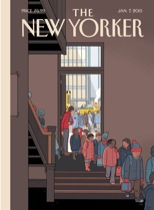 January 7, 2013: “The Lost Order” by Rivka Galchen
January 7, 2013: “The Lost Order” by Rivka Galchen
Read the Q&A with Rivka Galchen to understand the “seed” of this story, although that’s not particularly necessary in order to understand the story itself (which, by the way, is NOT behind the paywall, so you can go read it now, if you haven’t already).
We begin with a funny, tone-setting first line: “I was at home, not making spaghetti.” What a great way to establish this narrator’s voice and to begin to define her. And then by trying to explain why “not making spaghetti” is significant, she devolves into a wonderful digression about being unemployed, trying eat less, because . . . and then her digressive train of thought is interrupted by a phone call. The caller I.D. says “unavailable” and she usually doesn’t answer such calls—I can relate—but on a whim she answers this one. I can relate to this, too.
The call is hilarious. It’s obviously a wrong number as the caller launches into his order for delivery, garlic chicken, etc., and the narrator promises delivery in 30 minutes. Which shows pretty clearly, if the opening digression hadn’t made the point, that this narrator is coming unglued.
She digresses some more and rambles, and there’s another call. The reader and the narrator both assume it’s the previous caller, but it’s not. It’s her husband. Husband? It’s something of a surprise that she has a husband, just as it’s going to be a surprise that we find out the career that she’s unemployed from is that of environmental lawyer. The husband wants her to go look for his lost wedding ring—uh-oh, is there trouble in the marriage?—but she doesn’t want to go look, and, funnily enough, he suggests that she go and “not look for it.” He may realize that she’s good at this. And his tone suggests that he realizes how close to losing it this woman is, so she’s temporarily mollified.
This time when the phone rings it’s the guy who placed the garlic chicken order, but she still doesn’t tell him he has the wrong number. Instead, she hangs up and goes to look for the ring, which the husband thinks he lost in a nearby park. She doesn’t find it, but she does have a day-long digression. When she returns home, the husband gently confronts her about the secret she’s been hiding and discloses that he’s found 3 severance checks for her. (She had claimed she quit her job.) And he points out what we already know—that she’s lost it and is just drifting.
And the story comes to an end, with her wondering.
Satisfying? Not really. Is she drifting because she was unhappy at work and so quit or got fired? Is she drifting because the world is full of mis-directed telephone calls? Not clear to me. You?

In The Lost Order, Galchen shows a protagonist who is living the life of a photographic negative – she’s given up trying to do things in life and instead is trying not to do too many wrong things, and in not doing anything just gets lost. The narrator is trying not to cook spaghetti; sees getting dressed as both a problem and when solved, an accomplishment; tries not to surf the internet; she sees eating less as a valid primary goal. The lost wedding ring symbolizes a dysfunctional marriage and perhaps, broken vows. Her reluctance to search for the ring shows an uncaring attitude about repairing the marriage. The title of the story, The Lost Order, is both a pun on the mis-directed order for Chinese food and the order lost in what may have been an orderly life of the narrator before a downward spiral began, back when her husband was able to trust her.
The severance check is something of an enigma – the reader is left wondering about how to reconcile a severance check, ostensibly for getting fired, and the narrator’s insistence that she ‘tendered her resignation.’ I don’t think it’s important to know whether the narrator was fired or not. The discovery of the check casts doubt on everything the narrator has said up to that point; it defines her as an untrustworthy narrator.
Ultimately, the narrator finds herself in some la-la land, looking for unicorns and telling lies that don’t benefit her (why lie about the fries at the Peruvian restaurant and tell her husband she ordered a salad – is he complaining about her recent weight gain?). And yet, I get the impression that she wants to reconnect with life. The climax of the story is when she asked the UPS women, the ones whom she admires for solving the getting-dressed problem, if someone was bothering them. Does her instincts as a lawyer kick in? Is she somehow warning and coming to the rescue of the women?
I found the story to be subtle and wonderfully-written. If you get the audio version, listen to Galchen read the story; her voice has a lyrical quality that would sound dreamy reading the telephone book – or perhaps counting backwards from one hundred.
I think I might call this genre of fiction: “Want to hear about my parents’ divorce?” writing. The voice is ennui-ridden, inauthentic, contradictory, passive, and misleading. I couldn’t believe the character, because she’s not there.